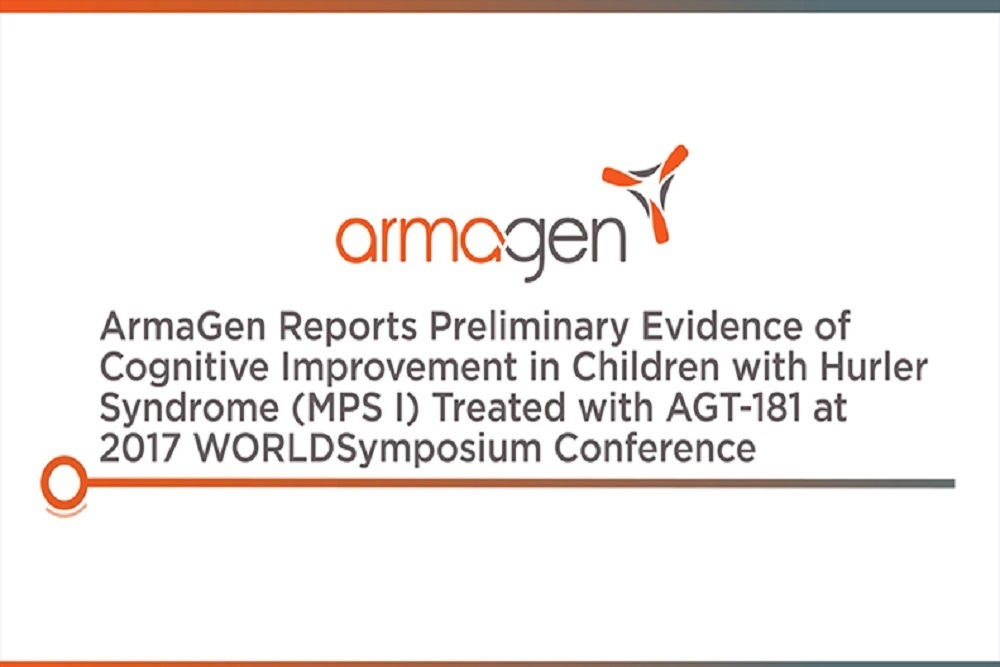ArmaGen, Inc. issued the following announcement on Feb. 8.
ArmaGen, Inc., a privately held biotechnology company focused on developing groundbreaking therapies to treat severe neurological disorders, today reported full 52-week results from a Phase 2 proof-of-concept study with AGT-181, the company's investigational therapy for the treatment of mucopolysaccharidosis type I, or MPS I (also known as Hurler, Hurler-Scheie and Scheie syndromes). Data presented at the 14th Annual WORLDSymposium in San Diego, California, suggest that AGT-181 stabilized the neurocognitive development quotient (DQ) in patients with severe MPS I. The data validate previous findings that demonstrated the ability of ArmaGen's proprietary drug delivery technology to transport biopharmaceuticals across the blood-brain barrier (BBB) and provide therapeutic benefit to patients with severe MPS I.
In an oral presentation entitled, "Safety and clinical efficacy of AGT-181, a brain penetrating human insulin receptor antibody-iduronidase fusion protein, in a 52-week study with pediatric patients with mucopolysaccharidosis type I," Roberto Giugliani, M.D., Ph.D., of Hospital de Clínicas in Porto Alegre, Brazil, reported the following:
- Stabilization of several measures of neurocognitive function as measured by DQ -- a numerical indicator of a child's growth to maturity across a range of cognitive competencies -- in children treated with AGT-181 for one year
- On a somatic level, AGT-181 stabilized urinary glycosaminoglycans, reduced liver and spleen volume including in patients previously exposed to laronidase, and further improved shoulder range of motion
- AGT-181 displayed a favorable long-term safety and tolerability profile. Most frequent drug-related adverse events were infusion reactions (1.7%) and transient hypoglycemia (2.8% at 1 mg/kg and 3 mg/kg).
"The full results from this Phase 2 study validate our preliminary findings that AGT-181 crosses the blood-brain barrier and benefits neurocognitive function in children with severe MPS I," said Dr. Giugliani. "Whereas the existing enzyme replacement therapy improves many of the somatic manifestations of MPS I, its inability to cross the blood-brain barrier prevents it from addressing the severe and progressive neurological symptoms of the most severe form of the disorder. Now that we have demonstrated proof of concept, a controlled phase 3 clinical trial is warranted to examine long term impact in cognition in MPS I patients with CNS involvement."
At the 13th Annual WORLDSymposium in 2017, Dr. Giugliani presented preliminary evidence of cognitive improvement in age-equivalent function in the first five children with MPS I who were enrolled in the Phase 2 study, after six months of treatment with AGT-181. This year's presentation included the full set of 52-week data from all 11 children (age 2 years or older) enrolled in the trial. Nine of eleven patients had previously been treated with enzyme replacement therapy and one had received a stem cell transplant which had failed engraftment. The children received weekly intravenous infusions of AGT-181 at doses of 1.0, 3.0 or 6.0 mg/kg. The investigators conducted developmental age-appropriate neurocognitive testing at 13, 26 and 52 weeks of treatment, utilizing the following validated neurocognitive assessments tests: the Bayley Scales of Infant Development Third Edition (BSID-III) or the Kaufman Assessment Battery for Children (KABC-II), and the Vineland Adaptive Behavior Scales Second Edition (VABS-II). Together, these tests represent a summation of scores reflecting cognitive, language and motor skills.
Dr. Giugliani reported stabilization of the cognitive DQ with no net decline after 52 weeks of AGT-181, as would normally be expected for the severe MPS I patients that have not undergone successful hematopoietic stem cell transplantation. He also presented stabilization of cortical grey matter volume at 52 weeks of AGT-181 therapy. Among the nine patients previously on laronidase ERT for 1-12 years, AGT-181 was associated with further improvements in somatic disease control, based on further reductions in liver and spleen volume, and increases in shoulder flexion and extension range of motion. Additionally, the anti-drug antibody (ADA) profile with AGT-181 treatment was comparable to that observed with laronidase, Dr. Giugliani reported.
AGT-181 was well tolerated. Out of more than 570 infusions, there were 10 infusion-related reactions (IRRs) – an incidence rate of 1.7%. Sixty percent of IRRs were observed in a single patient not previously on ERT; this patient developed tolerance to AGT-181 by the tenth week of therapy. Other drug-related adverse events (AEs) included transient hypoglycemia (5.9% incidence) that resolved within 10-20 minutes following a snack or glucose administration. Most hypoglycemic events (62%) occurred in patients taking high-dose (6 mg/kg) AGT-181 therapy. Among patients receiving an infusion dose of 1-3 mg/kg, the incidence of hypoglycemia was 2.8%. The investigators observed no serious AEs that were likely to be drug-related.
"By confirming our initial findings of neurocognitive stabilization/improvement in children with MPS I, the full results from the Phase 2 proof-of-concept trial – coupled with our recent receipt of a Fast Track designation from the FDA – sustain the momentum of finding a new treatment option for patients with MPS I," said Mathias Schmidt, Ph.D., Chief Executive Officer of ArmaGen. "The latest results add to the growing body of evidence that our proprietary 'Trojan Horse' technology can deliver the missing enzyme into the CNS of patients and benefit neurocognitive function. We are most grateful to the patients and families who participated in the Phase 2 study."
Original source can be found here.









 Alerts Sign-up
Alerts Sign-up